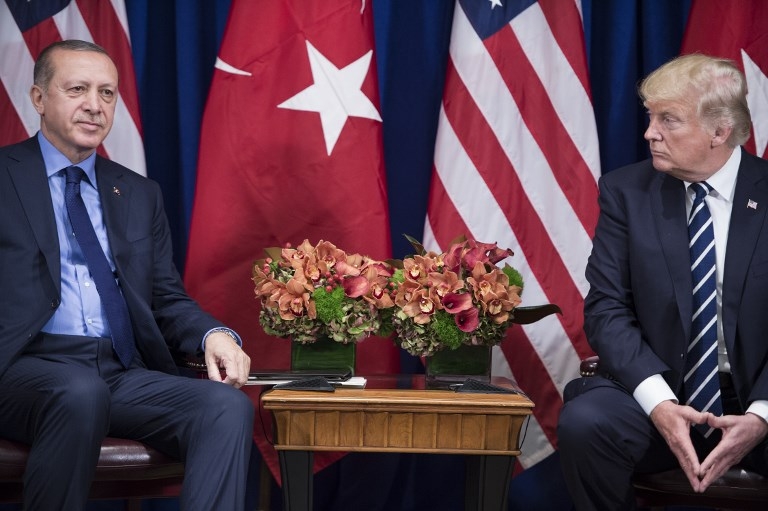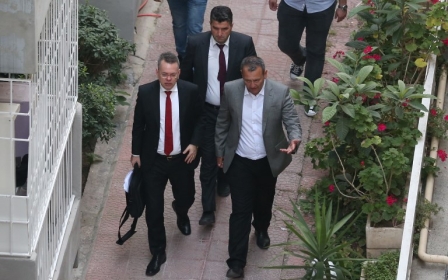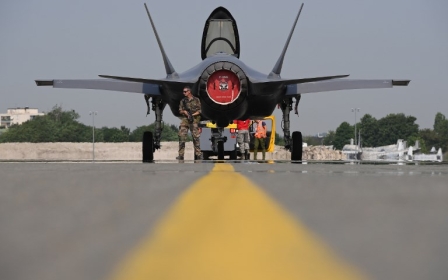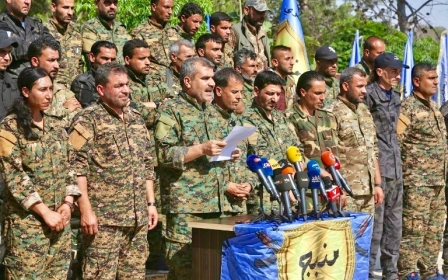With Brunson out of jail, US-Turkey relations still face two major hurdles

American Pastor Andrew Brunson, who was at the centre of the diplomatic row between Turkey and the US, was released on Friday, after a two year-long detention.
At the height of the fight this summer, the two countries slapped sanctions on one another and sent harsh words back and forth across the Atlantic.
But in recent weeks, Brunson's release became the subject of talks “at the highest level” so that the US and Turkey could move on to dealing with over issues facing the NATO allies, a US diplomat told Middle East Eye.
The Americans, a Turkish diplomat told MEE, drew a line during the talks and told Ankara: "We have no more to give or to negotiate, release Brunson and let's start talking then".
With Brunson out, the diplomat said it's time to "deal with the real problems". There are two:
Control of Manbij
Manbij has been a source of tension between the two countries since 2016, when the Syrian Democratic Forces (SDF), led by the Kurdish People's Protection Units (YPG), took control of the city with the support of the US army.
Turkey views the YPG as a terrorist group and an extension of the PKK, which has waged a three-decade insurgency on Turkish soil. Washington sees the YPG as a key ally in the fight against the Islamic State (IS) group.
With Brunson out, the main issue between Turkey and the US now, a Turkish diplomat told MEE, is the “US ambition to create an autonomous state for the YPG in Syria".
In an effort to find common ground to solve the dispute, the two countries agreed in June to start joint patrols in Manbij, the only Syrian province under SDF control west of the Euphrates River.
At the time, the US agreed that the SDF would withdraw and move east of the river within 90 days.
The 90-day deadline passed in early September but the SDF is still in Manbij, and joint patrols, which were expected to begin in July, started only on 9 October.
Meanwhile, Turkish President Recep Tayyip Erdogan has recently signalled a coming military operation against the YPG east of the Euphrates River.
During his speech in an event in New York on 24 September, he said: "We will take steps, which are similar to the operations of Euphrates Shield and Olive Branch, in the east of Euphrates in the forthcoming period."
Turkey targeted the YPG in Afrin with Operation Olive Branch early this year, deploying troops and tanks to the border.
A Turkish security official told MEE that, in the short term, there are no plans for any operations in the area, where around 2,000 US officers are based to train and advise the SDF.
“Whatever Erdogan says, there is a response," he said. "The deployments...they always come with a result. The joint patrols in Manbij started after he spoke up publicly and raised the question of YPG’s existence in the city.”
Ankara believes that the US is holding on to Manbij as a trump card for eventual political negotiations. “They will easily give up Manbij in return of some oil wells in Deir Ezzor or Raqqa,” he added.
The S-400 purchase
There is a second burning issue facing the two countries: the S-400s.
Despite Turkey's support for Syrian opposition groups and Russian backing of Syrian President Bashar Assad, the two countries have cooperated in Syria since 2016.
Turkey was able to conduct its two operations in northwest Syria earlier this year after Russia opened the airspace over Syria for Turkish fighter jets.
In September 2017, Turkey decided to buy Russia’s S-400 missile defense system, despite the opposition of its NATO allies - and concerns from US lawmakers that Russia could collect intelligence on American F-35 technology with the systems.
This June, the US Senate approved a bill that would block or delay the sale of the F-35 fighter jets to Turkey, and earlier this month, US President Trump decided to delay the delivery of jets to Turkey for at least 90 days.
Turkish officials have told their American counterparts for years that Ankara wants to buy the US-made Patriot air defence system, but that the Turkish government has grown increasingly sceptical about the transaction ever taking place.
Mevlut Cavusoglu, the Turkish foreign minister, said on 28 August that Turkey had been eager to buy the Patriot surface-to-air missile system, but was once again rebuffed by the Americans.
Weeks before Brunson’s release, a US diplomatic source told MEE that relations can only be improved if Turkey gives up its decision to buy the S-400s.
Turkish sources close to negotiations between the two countries say that the use of S-400 systems would create a crisis between Turkey and the US because the systems are capable of targetting and hitting most NATO missiles.
As the Americans urge Turkey not to use the system, Turkish officers worry about the potential for further sanctions after the delay of the F-35s.
In addition to domestically produced weapons, the Turkish army also uses US-made heavy weapons in its operations in Syria. Any sanctions on those would affect Turkish army’s capabilities.
A Turkish security source told MEE that S-400s might never be pieced together or activated after receiving in order to prevent any confrontation with the NATO systems and the US.
Stay informed with MEE's newsletters
Sign up to get the latest alerts, insights and analysis, starting with Turkey Unpacked
Middle East Eye delivers independent and unrivalled coverage and analysis of the Middle East, North Africa and beyond. To learn more about republishing this content and the associated fees, please fill out this form. More about MEE can be found here.




